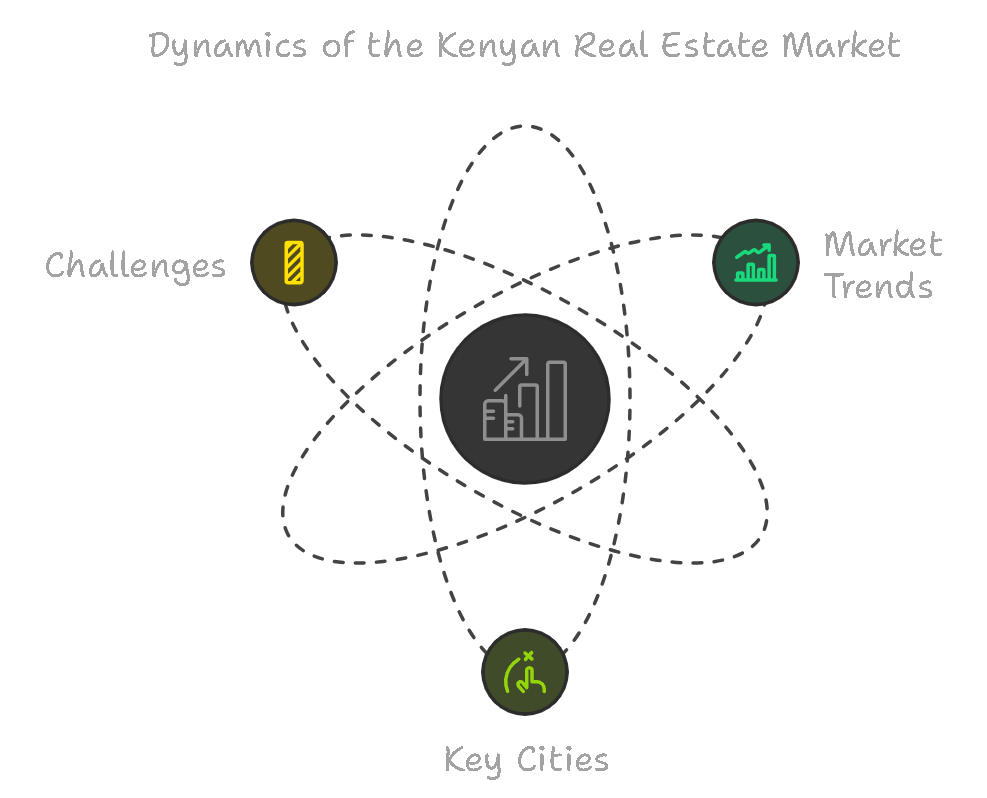An Overview of Real Estate Investment in Kenya
The real estate market in Kenya continues to grow as a dynamic and promising sector, offering opportunities for both local and international

The real estate market in Kenya continues to grow as a dynamic and promising sector, offering opportunities for both local and international investors. This blog explores current market trends, key cities to watch, and the potential challenges in navigating the real estate landscape in Kenya.
Current Real Estate Market in Kenya
Kenya's real estate sector has witnessed substantial growth in recent years, driven by increasing urbanization, population growth, and a growing middle class. Nairobi, the capital city, remains the epicenter of activity, with a surge in demand for residential, commercial, and mixed-use properties.
Trends in Nairobi:
-
Urban Housing: Demand for affordable housing is rising, supported by government-backed initiatives like the Affordable Housing Programme.
-
Luxury Developments: Areas like Karen, Kilimani, and Runda continue to attract high-end developments aimed at expatriates and affluent locals.
-
Office Spaces: Flexible workspaces and co-working hubs are thriving post-COVID-19 as companies adapt to hybrid work models.
Beyond Nairobi:
-
Mombasa: Investment in coastal properties is growing, particularly in vacation homes and tourism-centric developments.
-
Kisumu and Eldoret: These cities are emerging hubs due to infrastructure development, including airports and highway upgrades.
-
Nakuru: A hotspot for agribusiness-linked real estate, attracting both residential and commercial investments.
Opportunities in the Kenyan Real Estate Market
-
Affordable Housing: Significant government incentives and partnerships with private developers provide a lucrative avenue for investment.
-
Green Buildings: Sustainable construction practices are gaining traction, appealing to eco-conscious buyers and developers.
-
Mixed-Use Developments: Combining retail, office, and residential spaces, these projects cater to the needs of an urban population seeking convenience.
Challenges and Considerations
-
Regulatory Hurdles: The real estate sector is subject to complex legal frameworks, requiring due diligence in land acquisition and property registration.
-
Financing: High-interest rates and limited access to affordable mortgages remain a barrier for many buyers.
-
Market Volatility: Economic factors, such as inflation and currency fluctuations, can impact property values and investment returns.
FAQs About Real Estate Investment in Kenya
1. Is Kenya's real estate market profitable for foreign investors?
Yes, the sector offers high returns, especially in high-demand areas like Nairobi and Mombasa. However, foreign investors must comply with local regulations, such as restrictions on freehold land ownership.
2. What are the best areas to invest in Kenya?
Nairobi leads in commercial and residential investments, while Mombasa is ideal for tourism-linked properties. Emerging cities like Kisumu and Nakuru also offer promising opportunities.
3. Are there risks involved in real estate investment in Kenya?
Like any market, risks include regulatory challenges, market volatility, and potential land disputes. Partnering with reputable local firms can mitigate these risks.
4. What types of properties are in demand?
Affordable housing and mixed-use developments are highly sought after. Luxury apartments and eco-friendly homes also cater to niche markets.
5. How can I finance my real estate investment in Kenya?
Options include bank loans, mortgage plans, and partnerships with local developers. Researching financial institutions that offer competitive interest rates is crucial.
Real estate in Kenya is a growing market with diverse opportunities for investors willing to navigate its dynamic environment. Whether it's in the bustling streets of Nairobi or the serene coastlines of Mombasa, Kenya's real estate sector promises potential for growth and profitability.